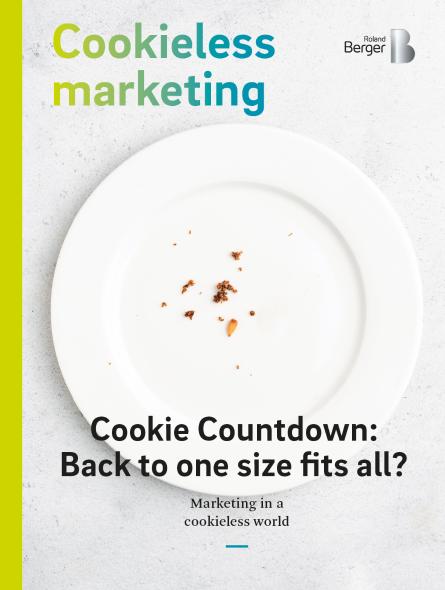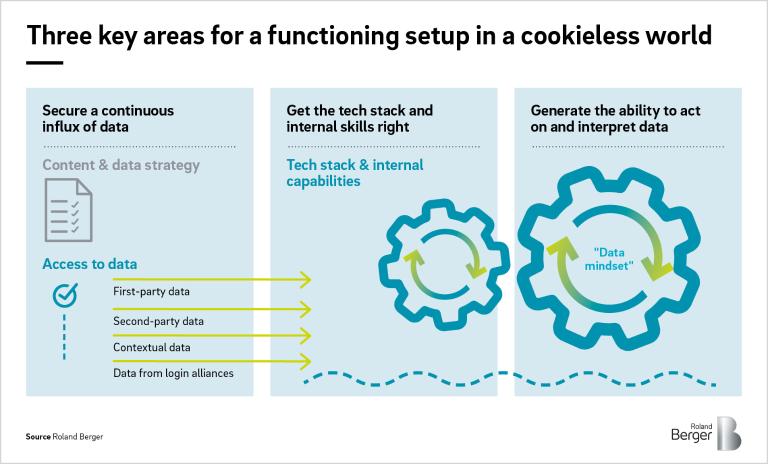Read in Roland Berger´s publication how established companies can be inspired by and learn from born-good companies and digital natives.


Back to one size fits all? Marketing in a cookieless world
By Beate Rosenthal and Steffen Thiel
Essential guidance for a world of post-cookie marketing
Cookies in general – and third-party cookies in particular – have for decades been a vital data source that helps digital marketers target and reach out to users with relevant content. However, a combination of privacy policies, regulatory interventions and changing user behavior will sooner or later lead to the death of third-party tracking cookies. This development will mean fundamental changes for a whole ecosystem of advertisers, publishers and agencies, and to some players’ entire business models that are to a large extent based on third-party tracking cookies.

A new Roland Berger whitepaper takes a deep dive into this topic, explaining what third-party cookies are, highlighting why they are set to disappear, and asking how the players affected can respond in order to safeguard their businesses’ future. Quick wins and best-practice solutions of FMCG players are further discussed. For every company affected by the forthcoming cookieless world, this is a must-read resource.
"Managing change is the key success factor for companies transforming themselves for the cookieless future."
Different flavors of cookies
Some cookies are essential to keep websites running and guarantee security. But many of these small text files are placed on users’ computers to collect information that can be used to tailor marketing approaches. After discussing the merits of different types of cookies, the paper focuses primarily on third-party cookies, which are typically deployed for cross-site tracking, retargeting and ad serving. As an extremely rich source of relevant data, these cookies have proved invaluable to marketeers of all varieties, providing intimate insights into the needs, preferences and habits of (potential) customers. So, why change a winning team?
Privacy and consent – The turning tide
In Europe and the USA in particular, concerns about data privacy have been voiced with increasing stridency in recent years. Big Tech has come under pressure, prompting two of the world’s most three most popular web browsers to block third-party cookies some years ago. The stated aim is now to move back to data collection based on explicit user consent, and to give users realistic opt-out possibilities. But with Google announcing similar steps for the world’s preferred web browser and users changing their habits anyway – not to mention the complications added by omnipresent mobile devices – the tide appears to have turned irrevocably. Cookie tracking, in other words, is on its way out.
But where does this leave the digital advertising ecosystem, which – in terms of digital history – has long relied on third-party cookie-fed data?
What now? Marketing successfully in a cookieless world
Companies that are part of the digital advertising ecosystem must now find alternative ways forward. The whitepaper thus addresses what market players are advised to do now to succeed in a largely cookieless world. Clearly, they need data from somewhere if they want to remain relevant. But that is far from the only consideration. Roland Berger ultimately condenses the many important issues involved into three key areas that must interlock seamlessly to deliver a future-proof marketing strategy .
1. Ensuring a continuous influx of data
Faced with such a serious disruption to its existing data supply chain, the first and most fundamental step is obviously for companies to secure alternate sources that will continue to feed their data-driven marketing going forward. Four main possibilities present themselves, though Roland Berger cautions that the relative importance attached to each must vary depending on the individual situation of each market player:
First-party consumer data
Consumer data that your organization collects for itself is very valuable. The issue here is therefore to find more and more ways to elicit this data – by maximizing points of contact along the customer journey, for instance, but also by looking more closely at the potential of customer loyalty programs. Bringing together the wisdom of front-line outside experts, best-practice market players and Roland Berger’s own specialists, the whitepaper explores how these and other powerful tools can plug the gaping hole in data pipelines left by now-absent cookies.
Second-party partnerships
What you don’t generate yourself can be bought from elsewhere: This is the logic of the second option. While some companies have been nurturing such partnerships for years, it is never too late to get started. The paper therefore examines the numerous factors that must be considered here – including upstream sources, plus the option of monetizing first-party data by offering (and not only soliciting) second-party partnerships.
Contextual data
Gathered from the wider content environment and the immediate usage situation, contextual data can provide valuable complementary insights into
customer behavior
and a great basis for advertising. Culling this data from relevant third-party organizations can be combined with
machine learning
and heuristic techniques to fuel perhaps surprisingly focused marketing approaches.
Collaborative data collection strategies
This option centers primarily around what are referred to as login alliances, which give users the benefit of single sign-on across multiple websites. In return, alliance partners can access a wealth of valuable cross-site data for use in their advertising activities.
2. Optimizing technical skills and infrastructures
This complex but critical aspect is discussed in considerable depth – and for good reason. Sourcing quality data in the requisite quantities is all well and good. But the organization also has to be able to interpret this raw material and transform it into end product. This, as the whitepaper explains, will demand substantial investment in both technical solutions and several areas of digital expertise.
While off-the-shelf technical infrastructure is certainly available, would-be market leaders will be keen to tailor solutions to their individual goals and operational capabilities . The infrastructure must also run seamlessly throughout the organization to avoid data “dead-ends” that could frustrate the entire venture. To this end, digital expertise too must be built up with a focus on areas such as data-driven marketing , collaboration at the interface between marketing and tech functions, and legal matters in the context of data privacy. The repercussions for internal organizations are far-reaching indeed: The drive to upskill employees will change everything from HR functions to training formats to job descriptions. As in all the issues discussed to date, top management commitment will be of paramount importance here as well.
3. Fostering a data mindset
All of the above logically leads to one further conclusion about post-cookie marketing efforts: The demise of the cookie is not the last radical change that digital marketing will have to face. Going forward, companies must develop an agile culture built around a digital mindset – a mindset that can adapt and evolve again and again over time. As the whitepaper spells out, teamwork, transparent communication and a test-and-learn environment are three essential ingredients in forging a permanently transformative culture.
Getting started – Help is at hand
If all that sounds like a tall order, you have been listening carefully! Faced with the prospect of losing their main data pipeline, digital advertisers, agencies and publishers are understandably nervous and unsure about the major changes that lie ahead. That, however, is the whole purpose of the new Roland Berger whitepaper, which merges in-depth analysis of the pivotal issues with details of customizable solution strategies, practical insights from experts in the industry and a checklist to make sure decision-makers cover all the bases as they transition to a cookieless world.
Register now to download the full publication on Cookieless Marketing, including insights from our expert interviews and more information on how to succeed in the cookieless world. Additionally, you get regular insights into Consumer Goods & Marketing topics.






